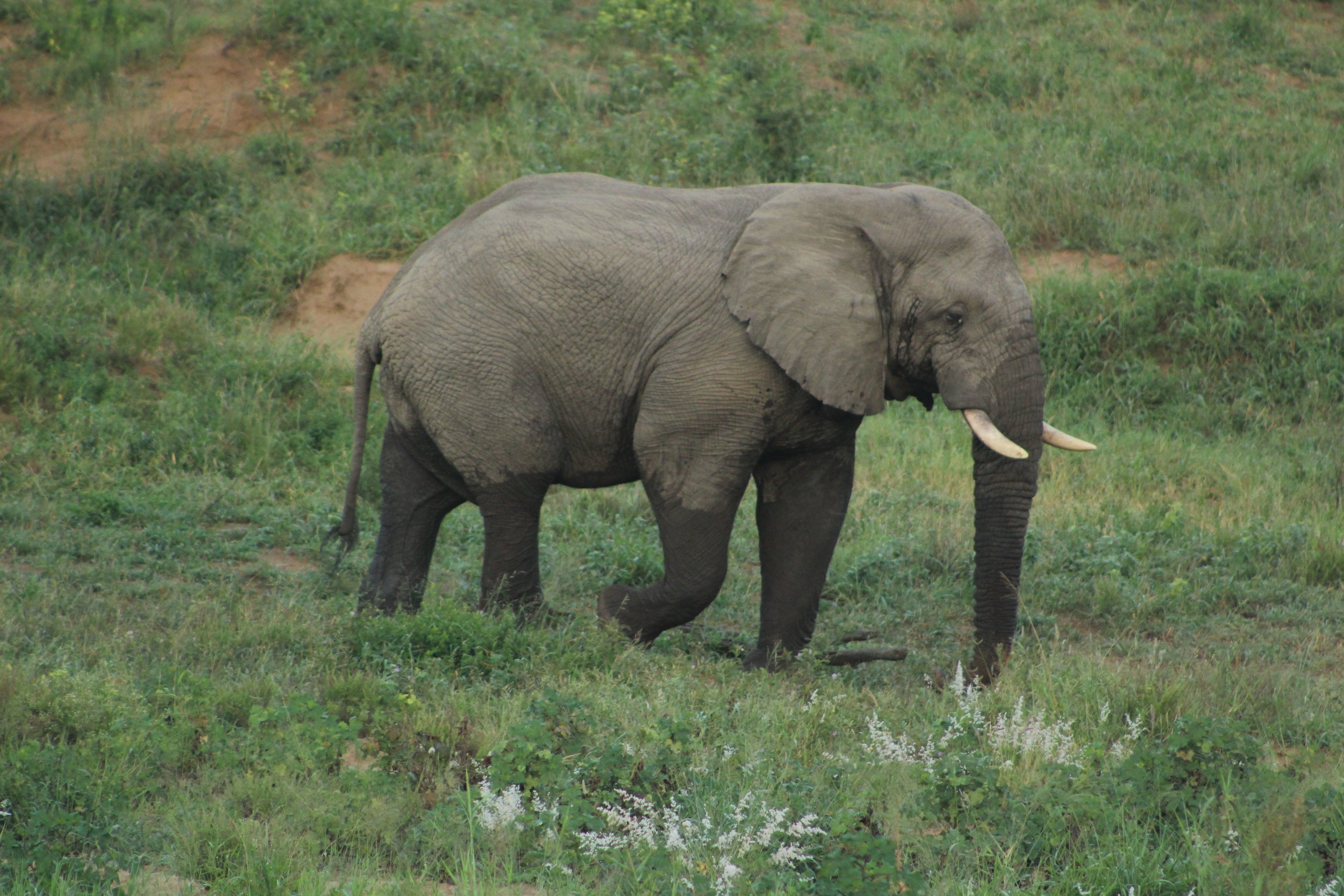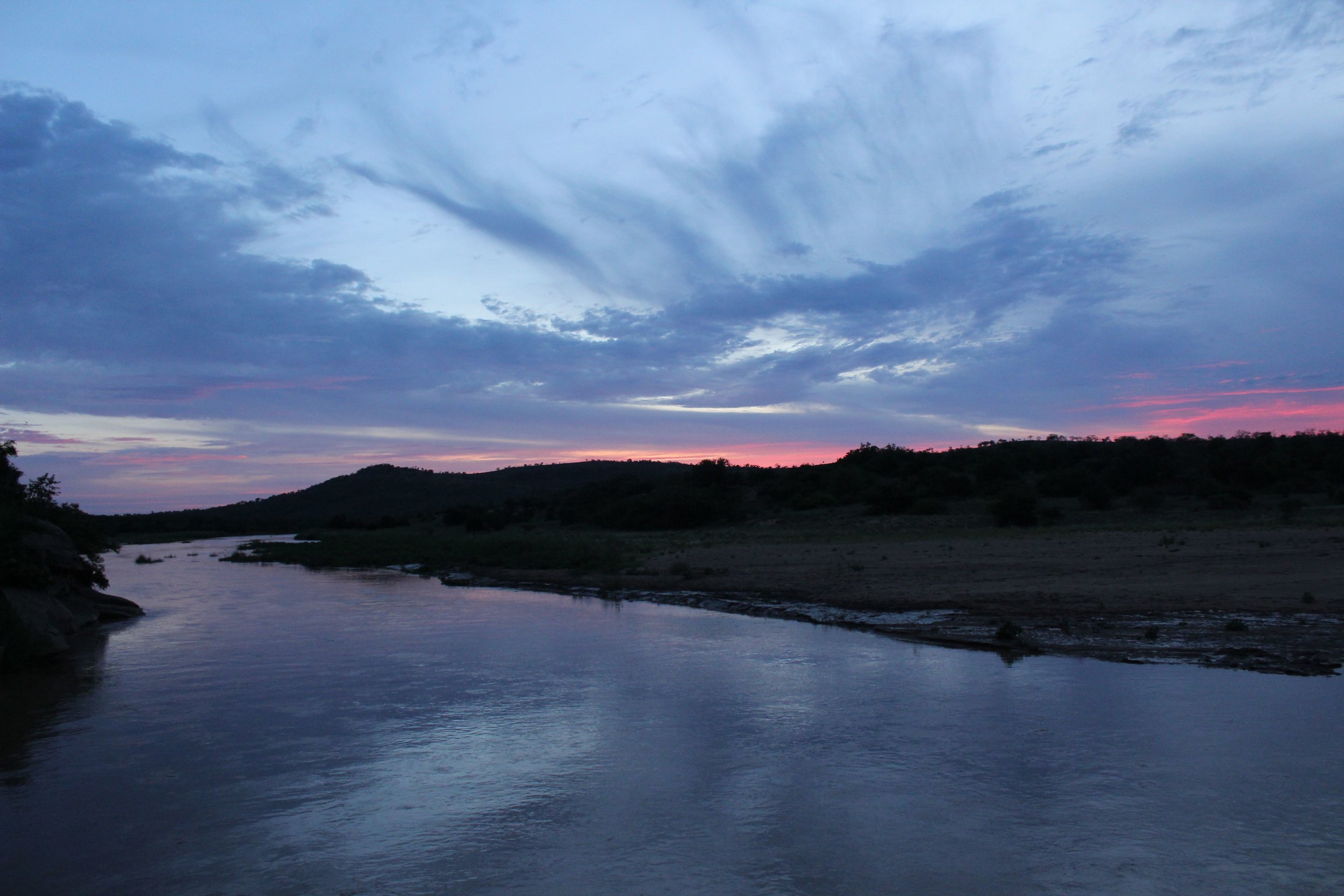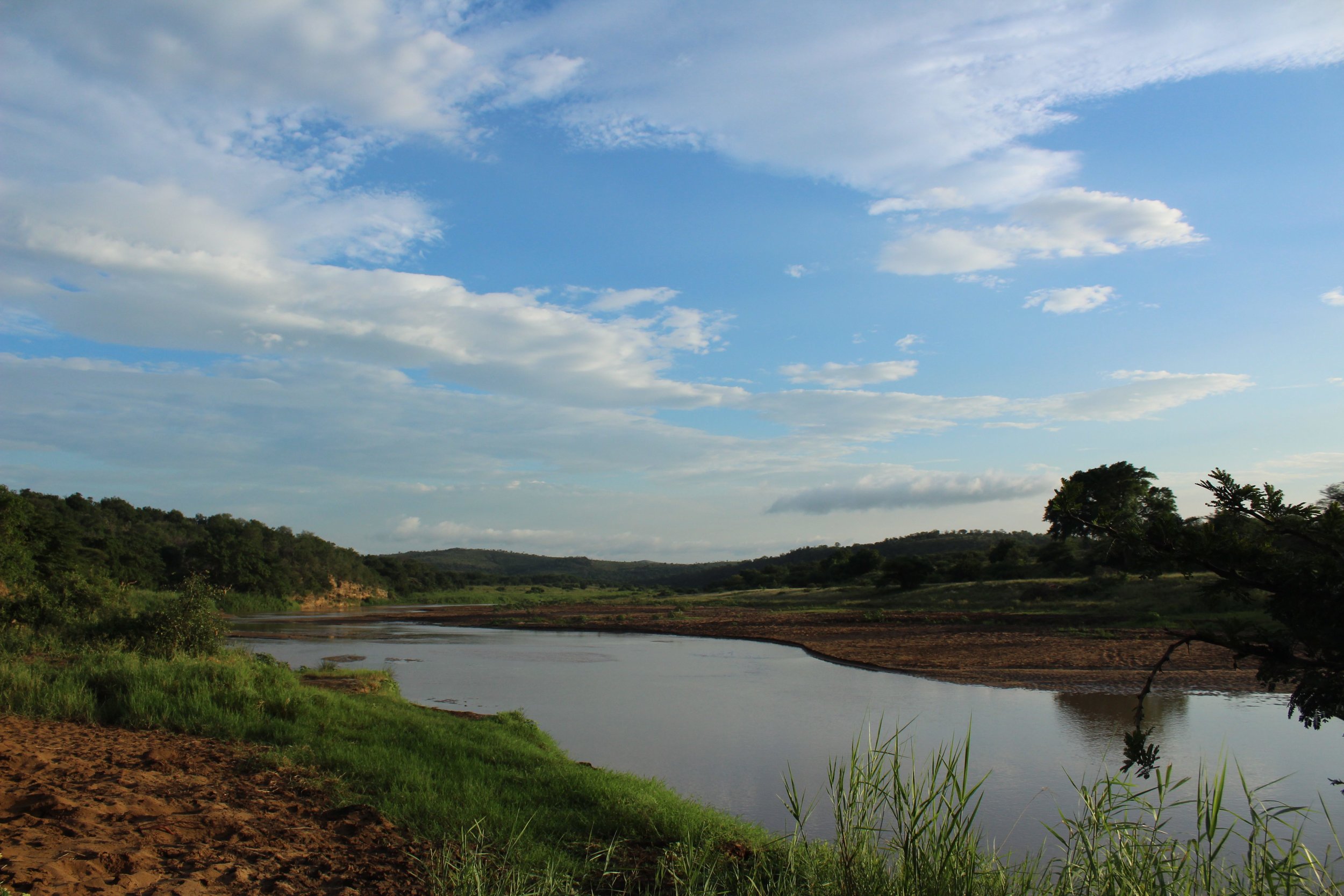Wilderness Wisdom
By Sharlene Versfeld
We looked over the muddy waters of the Umfolozi as the heat seared through my freckled skin. I longed for the shade that the lunch-stop across the river promised. And the least of our worries were the crocodiles that could be lurking in the milky brown water. Rather a massive “daka” boy, a lone male buffalo, known for being notoriously bad-tempered, lay in the water on the opposite back. His massive, muscular back arched, his head down and relaxed on the cool sand. He was going nowhere. It was midday and hot as hell.
Our guide Mandla Gumede approaches the river, cautiously but with enough visible movement and natural sound, in an effort to ensure our “daka boy” knows we are here. Conflicted. On one hand, he had 6 tired, hungry and hot trailists collapsed in sweaty heaps on their heavy backpacks, waiting for his instructions, and on the other – a very deep “leave no trace” ethic buried beneath his skin. That “you-don’t-mess-with-anything-in-the-wilderness” kind of ethic. You come and go and you just don’t go messing with anything. I understood that too, so I whispered, half in jest, half in desperation but oh so respectfully, “Please, please Mr Buffalo, just get up and go so we can cross.” And he did. He just got up, turned to look at us for a while, and then trotted through the reeds and high up onto the grassy plain beyond.
“The secret to the success of the Wilderness Leadership School is “hlonipha”,” said Simon Blackburn, owner of Tree Tops Lodge at Spioenkop a few weeks earlier when I met him on a wildlife medical emergency seminar, “that’s why these guys have virtually no problems on trail in the big five reserves.”
Hlonipha, the isiZulu word for respect, pervades every being of the trail guides in Ian Players’ legacy programme, which sees highly experienced guides take trailists out into the wilderness areas of the Umfolozi/Hluhluwe Game Park. Simply put, you leave no trace, except your tracks. And this means no emotional trace either – no trauma, no impact on the emotional well-being of the creatures in whose home we are privileged to be able walk. So of course Mandla was cautious, and I was glad I had, in that moment, become “a buffalo whisperer”.
The Wilderness Leadership School takes groups of 6 trailists at a time into pristine reserve areas. The trailists must carry all their cooking, food, bedding, and personal requirements in and out of the reserve – and must leave no trace. No burnt firewood, no broken branches, no upturned rocks, no toilet paper, nothing.
Stepping into the Hluhluwe/Umfolozi reserve, packs laden, we were briefed under a tree. It’s serious business. You could die out there. “Just remind me again, I take cover if it’s a buffalo or rhino, and only then if you say so. And I don’t run if it’s a lion? I stand still, right. So the lion does not identify me as prey?”
“Isn’t it strange, that this is where humanity inhabited with ease not too long ago,” said our other guide Doric Holmes later, as Mandla was showing us the track of an extremely large lion, and our adrenalin juices were flowing (very) fast. “We lived here in the wilderness, amongst all of this, the animals and creatures, and were not afraid. And now we return and are so out of touch and disconnected that we fear it.”
An ancient place and space. Here a royal hunting area, once teeming with game. Remnants of Shaka’s Zulu people, who lived at one with the land, lie scattered around. The pottery shards and broken grinding stones that pepper the edges of the ageless animal paths, echo a rich history of a people and a oneness with nature.
Walking and living on trail is the ultimate nature experience. Us trailists follow, in single file, our two guides, both armed in case of a dangerous interaction with an animal. Neither of our guides had ever needed to use their rifles. “We track, we listen and we observe the animals, so that we are no invading their comfort zones. Respect is important. Quiet is important. Being present is important.”
So present that one morning Mandla, who was lying chatting to us in his sleeping bag, as we drank our hot drinks, jumped up to show us that an elephant was crossing the river. So tuned in he was he could hear the lone bull, a good 300 metres up the river bank, enter the water.
As we walk we notice the tracks. We stop to discuss what it is, the direction the animal was heading, how old we think the track is. We sit by watering holes and watch the giraffe, zebra and impala skittish and aware of our presence. The “daka” boys snort and stand and watch from afar on the banks of the rivers, alerting us to the fact they have noticed us. The wild dogs, gladly present themselves, all nine of them on the sand bank in from of our camp, on the first morning as we sip our tea and dunk our rusks. All the while watching us, ears twitching. Mocking cliff chats settle in front of us wagging their tails on the cool rocks. The baboons bark and some raucous Egyptian Geese, well were just raucous. Then the frogs chorus, like competitive choirs at night, reminding us that they too own some pretty fine real estate here in the wilderness.
Our path crosses with a lone young bull elephant one day, and the guides move swiftly into action. One moves left to find a safe exit through a gully lined with magnificent Sycamore Figs. The other moves us downwind behind some trees. We remove backpacks, and wait for our instructions. Our exit planned, we don our gear and move swiftly out of the oncoming path of the elephant. Quickly we ascend the hill, with enough distance now to look back and observe him on the opposite bank. All the while his trunk up and alert as he continues to monitor us.
We camp in three places over the four nights, each time setting up before dark: gathering firewood far away from camp so as not to deplete the camp areas of dead wood needed for its own ecosystems to survive. Collecting and purifying the water – enough to wash and drink. Then making a small fire to cook, and settling in for the night under the stars, where each trailist takes watch alone for a few hours to ensure no animals pass through the camp.
It’s the first night, and having done a trail before, my adrenalin does not pump as fast as that first time on watch. I know now that it’s the anticipation of the nightwatch that is more scary than the watch itself. It’s now an opportunity to contemplate the vastness of the great sky lit with a million stars, and the crackle of the small fire, the rumble of the lions in the distance or the hyenas “whooooop, whoooop” and the odd owl, and the silence. And I am present now. Not home, not trawling Facebook, or answering a what’s app, or planning my day tomorrow. Absolutely now. For should I wander off I shall miss the stars, and the sounds or the visit by the hyena.
And therein lies the beauty of these trails. Of the connection we once had with the wilderness, with the trees, and the plants, and the bugs and snakes and the frogs and the animals. For within it we did not fear. Now without it we do.
Symbolically I enter the wilderness with a heavy backpack, and exit with one a whole lot lighter. And one thing is for sure, it is always very very difficult to leave.
-ends
The Wilderness Leadership School offers 4 night, 5 day trails with highly experience guides in various areas including Umfolozi/Hluhluwe Game Reserve, iSimangaliso World Heritage Site, Drakensberg World Heritage Site, the Wild Coast, Pilanesberg National Park and Okavango Delta World Heritage site.. For more information contact 031-462 8642 or email info@wildernessleadershipschool.co.za
Sharlene Versfeld is a Durban-based communications consultant and publicist.


